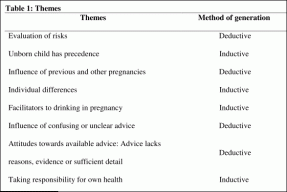Pregnant women’s attitudes towards alcohol consumption
Results
Participant Characteristics
The women’s ages ranged between 23 and 40 years (median 33 years). They were between 12 and 40 weeks pregnant (median 26 weeks). Four of the women had two children and seven women had one child. All participants were either married or cohabiting with a partner, educated to ‘A-level’ or beyond and had drunk alcohol before the pregnancy (the majority were married, had a university education and usually consumed up to 1-2 drinks per week before the current pregnancy). All but one reported a reduction in their alcohol consumption after pregnancy recognition, six abstaining completely. In terms of patterns, three women described consuming up to 1-2 drinks in total, seven up to 1-2 drinks per month, three up to 1-2 drinks per week, and one more than 1-2 drinks per week. Participants described safe levels of alcohol consumption during pregnancy as ranging from no alcohol at all, through one glass a day, to four glasses a day.
Half the women did not recall receiving any specific advice from health professionals about drinking during their current pregnancy. However, some mentioned being given written information by the general practitioner (GP) or midwife. Reported advice received on safe drinking levels ranged from abstinence to one to four units a week. Some women also mentioned that friends had been recommended different limits. Knowledge of the government advice varied. Thirteen women were aware that the advice had changed. Although eight of these women correctly recalled this, none were confident that they were correct.
Themes: barriers and facilitators to drinking in pregnancy
Eight themes were identified which related to the study aims (see Table 1). These all reflected barriers and facilitators to drinking in pregnancy.
 The influence of evaluation of risks on drinking in pregnancy
The influence of evaluation of risks on drinking in pregnancy
Prompted by previous research findings [20,26] that women were aware of the potential harm to their unborn baby of drinking during pregnancy, we explored how women evaluated the risks of drinking. Participants had assessed or considered the risk to themselves or to their unborn child. Perceived risk often influenced their drinking behaviour. If they thought that there was a high risk involved, they tended to completely abstain from alcohol or limit themselves to a very small amount. Women who were uncertain about possible risks erred on the side of caution.
“I go for the safety aspect, so because I’m not 100% sure, I just completely abstain to be on the safe side.” (Interview 10, no children)
Similarly women who found the given information inconsistent tended to be more cautious.
“Because there is so much conflicting information, I do think that the way to go is if you don’t drink any then there’s no risk.” (Interview 8, no children)
In contrast, women who thought that there was a low risk described more relaxed attitudes.
“If you drink in moderation and you’re sensible, then I don’t think it affects the fetus and if it has a relaxing effect on you, then I don’t see there’s any harm.” (Interview 14, two children)
Unborn child has precedence over drinking in pregnancy
This theme emerged inductively from the data and was related to the above theme. Participants described how their unborn child’s interests were first and foremost in their minds. These women revealed feeling an obligation to protect their child’s health and safety.
“I’ve got to think of my child, I’ve got to put them first.” (Interview 7, no children)
This view often took priority over any wish to drink alcohol while pregnant. Women therefore limited their drinking or completely abstained from alcohol during their pregnancy. In addition, a common view was that the period of time involved was manageable if the child’s best interest was at heart.
“It is only 9 months which isn’t very long… So it’s not that long really when you’ve got to think about somebody else’s life.” (Interview 7, no children)
Influence of previous and other women’s pregnancies on drinking in pregnancy
Other researchers [27] have found an association between previous pregnancy experiences and drinking behaviour and we explored this theme. Women recalled their own previous experiences of drinking in pregnancy or the pregnancies of friends and family members and the lack of any harmful effects on the outcome.
“I drank a little bit with my first child and I carried on doing that with my second and third pregnancies. My first child is absolutely fine.” (Interview 2, two children)
“I’m listening to the older generation as well and they used to listen to those old guidelines and most children are OK and weren’t affected by one or two units a week if they chose to have it.” (Interview 7, no children)
These experiences were mostly reassuring and these women did not attribute drinking in pregnancy to any harm to the child. Often, they were used as an example to justify the safety of drinking in pregnancy. However, family experiences were also described that negatively associated drinking in pregnancy with the child’s health.
“She was drinking because they never realised she was pregnant. And her son does have learning disabilities. Whether that’s connected or not, I don’t know.” (Interview 1, two children)